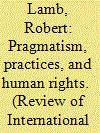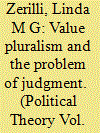|
|
|
Sort Order |
|
|
|
Items / Page
|
|
|
|
|
|
|
| Srl | Item |
| 1 |
ID:
108516


|
|
|
|
|
| Publication |
2011.
|
| Summary/Abstract |
This article examines the idea of equality in the theory of international society. Contrary to the widespread contemporary notion of equality as a corollary principle to sovereignty, the central argument of the article is that equality and sovereignty can and ought to be disconnected, and that the concept of equality, when uncoupled from sovereignty, is a better point of departure when theorising international society than is, for example, non-intervention or sovereignty. An alternative approach to deal with equality of states and other entities within international society is sketched out.
|
|
|
|
|
|
|
|
|
|
|
|
|
|
|
|
| 2 |
ID:
168864


|
|
|
|
|
| Summary/Abstract |
This article is an intervention in recent debates about conceptual and normative theorisations of human rights, which have been increasingly characterised by a divide between ‘moral’ and ‘practice-based’/’political’ understandings. My aim is to articulate an alternative, pragmatist understanding of human rights, one that is importantly distinct from the practice-based account with which it might be thought affiliated. In the first part of the article, I reveal the fundamental flaw in the practice-based account of human rights: I argue that it is undermined by the ontological thesis at its heart, which naturalises and reifies political arrangements and institutions that are radically contingent. In the second part, I identify, and outline the attractiveness of, a pragmatist normative account of human rights. In contrast to the practice-based approach, this pragmatist account construes human rights in ideational terms. The pragmatist understanding accepts both the contingency of our practices and the cultural limits to moral justification, while nevertheless retaining a commitment to the enterprise of normative philosophical conversation. I argue, in contrast to prevailing interpretations, that the international theory advanced by John Rawls exemplifies a pragmatist account of human rights and points a way forward for theoretically fruitful but appropriately circumscribed analysis of the concept.
|
|
|
|
|
|
|
|
|
|
|
|
|
|
|
|
| 3 |
ID:
099572


|
|
|
|
|
| Publication |
2010.
|
| Summary/Abstract |
Can Rawlsian theory provide us with an adequate response to the practical question of how we should proceed in the face of widespread and intractable disagreement over matters of justice? Recent criticism of ideal theorizing might make us wonder whether this question highlights another way in which ideal theory can be too far removed from our non-ideal circumstances to provide any practical guidance. Further reflection on it does not show that ideal theory is redundant, but it does indicate that there is a need for a nonideal theory that does not consist simply in an account of how to apply the principles which are yielded by ideal theory to non-ideal circumstances in the light of what is feasible and an assessment of the costs of implementation. Indeed any non-ideal theory that can adequately address this question will have to be partially autonomous, drawing on a notion of legitimacy that is rather different to the one which lies at the heart of Rawlsian ideal theory.
|
|
|
|
|
|
|
|
|
|
|
|
|
|
|
|
| 4 |
ID:
149680


|
|
|
|
|
| Summary/Abstract |
Is our moral cognition “colored” by the language(s) that we speak? Despite the centrality of language to political life and agency, limited attempts have been made thus far in contemporary political philosophy to consider this possibility. We therefore set out to explore the possible influence of linguistic relativity effects on political thinking in linguistically diverse societies. We begin by introducing the facts and fallacies of the “linguistic relativity” principle, and explore the various ways in which they “color,” often covertly, current normative debates. To illustrate this, we focus on two key Rawlsian concepts: the original position and public reason. We then move to consider the resulting epistemic challenges and opportunities facing contemporary multilingual democratic societies in an age of increased mobility, arguing for the consequent imperative of developing political metalinguistic awareness and political extelligence among political scientists, political philosophers, and political actors alike in an irreducibly complex linguistic world.
|
|
|
|
|
|
|
|
|
|
|
|
|
|
|
|
| 5 |
ID:
109939


|
|
|
|
|
| Publication |
2012.
|
| Summary/Abstract |
This essay examines the significantly different approaches of John Rawls and Hannah Arendt to the problem of judgment in democratic theory and practice.
|
|
|
|
|
|
|
|
|
|
|
|
|
|
|
|
|
|
|
|
|